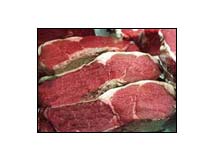FDA gives nod to cloned meat, milk safetyAgency asks producers not to introduce cloned products until after April; no word on labeling.NEW YORK (CNNMoney.com) -- The FDA announced a report Thursday finds meat and milk from adult cattle, pigs and goats and their offspring are safe for human consumption, although the agency is still asking producers not to introduce food from clones or their offspring into the food supply. The FDA's report, called a draft risk assessment, finds that the cloning technology creates meat that is as safe to eat as the milk and meat currently consumed.
The agency has not issued a decision on labeling meat or milk with products derived from cloned animals. The report concluded "that animal cloning is as safe as other assisted reproductive technologies," said Dr. Stephen F. Sundlof, director of FDA's Center for Veterinary Medicine. "Almost all food will come from sexually produced offspring of the animals and not from the clones," said Sundlof. Cloned animals are used primarily for breeding which can help create stocks with increased resistance to disease or with superior meat quality, said Sundlof. The FDA is continuing to ask producers and breeders not to release food from cloned animals into food supply until some time after the end of 90 day public comment period which will conclude on April 2, 2007. The announcement was met with disapproval from food safety advocates. "We see this as a lose-lose-lose situation for the consumer, the welfare of the animals and the dairy industry," said Joseph Mendelson, legal director, for the Center for Food Safety, a food safety advocacy group. Mendelson doubts the scientific support for the safety of cloned animals and their offspring in the food supply. The draft risk assessment effectively reverses the burden of proof on the matter of safety, Mendelson said. "The FDA is saying they can't find danger in cloned animals rather than finding them safe," Mendelson said. FDA's Sundlof said the actual number of cloned animals - a process he likened to identical twins born at different times - is small. "Only a few hundred cloned cattle, swine and goats are in existence," Sundlof said. The introduction of cloned animals or their offspring is likely to effect the business of large meat producers such as Hormel (down $0.16 to $37.74, Charts), Tyson Foods (down $0.06 to $16.55, Charts) and Smithfield Foods (down $0.03 to $25.81, Charts). "Cloning is part of the evolution of breeding practices and technology that has significant potential to improve the quality of food products derived from animals," said James H. Hodges, president of the American Meat Institute Foundation, an industry trade group. "As confident as we are in the science of cloning, we also recognize that consumers may have concerns with the notion of consuming meat and milk from cloned animals," Hodges said in a release. "We believe that FDA should be cautious about allowing meat and milk from cloned animals to be introduced into the marketplace if most consumers are unwilling to accept the technology," he said. ------------------------------------------------- |
|

